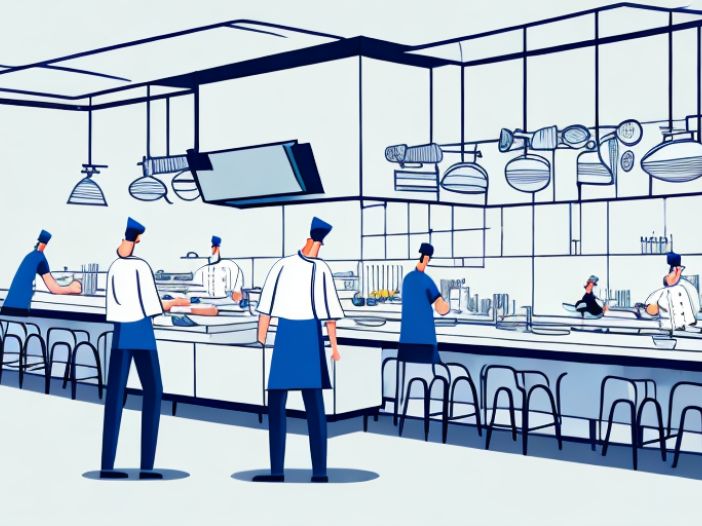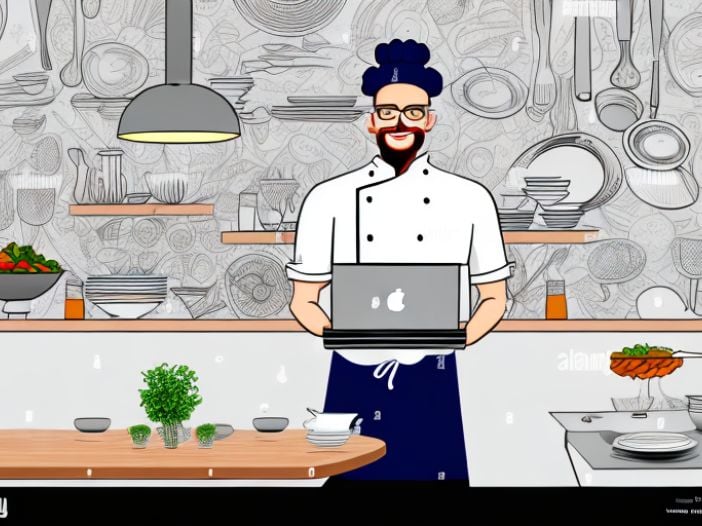We live in a world that is increasingly digital, where having an optimized online presence can be a key factor in your success as a restaurateur.
Just like a perfectly balanced dish, you need the right ingredients to bolster your online visibility. In this piece, we’ll delve into the nuances of restaurant SEO and offer practical strategies for boosting your digital presence.
The Role of SEO in Dining Decisions Imagine a hungry diner on the lookout for their next culinary adventure. More often than not, they’re turning to search engines like Google or Bing to decide where to have their next meal.
That’s where the power of restaurant SEO comes into play.
A well-optimized online platform for your eatery could bring it to the top of these search results, piquing the interest of potential patrons and leading to more traffic, reservations, and, ultimately, increased revenue.
SEO – Making Your Restaurant Shine Online
SEO isn’t just a bunch of buzzwords – it’s a multifaceted strategy to elevate your online presence. By implementing SEO techniques, you can increase the likelihood of your eatery shining brightly at the summit of search engine results, leading to heightened traffic, increased footfall, and a boost in sales.
A crucial part of the SEO puzzle is keyword research, pinpointing those buzzwords and phrases that potential patrons are using to search for their next dining experience.
By optimizing your online content to match these queries, your restaurant can climb the ranks of search results, driving more traffic your way.
Another aspect is local optimization, ensuring that your restaurant’s details, like name, address, and phone number (NAP), are consistent across all online platforms. This consistency can boost your visibility when potential customers are looking for local dining options, bringing them right to your doorstep.
Driving Diners to Your Door with SEO Effective SEO techniques can be a game-changer for your restaurant, reaching more potential customers online, boosting your revenue, and giving your establishment a competitive edge.
Moreover, SEO is cost-effective and offers enduring benefits for your restaurant’s prosperity.
Creating high-quality content on your website, like blog posts, videos, and other valuable resources, can establish your restaurant as an industry authority and draw more traffic to your site.
Link building is another powerful SEO strategy. By getting other websites to link back to your site, you’re essentially getting a nod of credibility from them, making your website seem more authoritative and trustworthy to search engines, which can boost your rankings.
In a nutshell, SEO is a vital ingredient in any restaurant’s online marketing strategy. By optimizing your online platforms, you’re more likely to catch the eye of potential customers, increase footfall, and boost your revenue.
Selecting the Right Keywords for Your Restaurant
The first step in your SEO journey is keyword research.
Identifying relevant keywords that resonate with your potential patrons can help your content rank higher in search engines, drawing more attention to your restaurant.
Identifying the Tastiest Keywords for Your Niche Unearthing the right keywords for your restaurant involves brainstorming terms that describe your cuisine, location, and unique selling points.
Keyword research tools like Google Keyword Planner can help you discover related keywords and their search volumes.
Competitor keywords analysis can also be a great asset. Using tools like SEMrush or Ahrefs, you can see what keywords your competitors are ranking for. This can help you refine your SEO strategy and potentially get a leg up on the competition.
Local businesses like restaurants also benefit significantly from long-tail keywords. These longer, more specific keyword phrases are commonly used in local searches and can help attract more relevant leads to your restaurant.

Mastering On-Page SEO Techniques for Restaurants
On-page SEO refers to strategies you employ on your website to improve its search engine rankings. For restaurants, this means paying attention to several key areas:
Website Content
Your website content should be informative, engaging, and updated regularly.
It should include a menu with descriptions of your dishes, a blog where you share updates or interesting insights about your food or the restaurant industry, and about us page detailing your restaurant’s story and mission. Remember to naturally incorporate your chosen keywords into this content.
Meta Descriptions and Title Tags
Each page of your website should have a unique title tag and meta description.
These are displayed in search engine results and can influence whether someone clicks on your website. Incorporate relevant keywords and make them compelling.
Images
High-quality, appetizing photos of your food can entice visitors to your website. Ensure each image has an appropriate file name and alt text, which helps search engines understand what the image is about. This is also an opportunity to incorporate keywords.
Website Navigation
Your website should be easy to navigate. Clear, intuitive site navigation can help reduce your bounce rate (the percentage of visitors who leave after viewing just one page), which can positively impact your SEO.
Internal Links
Including internal links helps search engines understand the structure of your website, and helps visitors explore more of your content. For example, you could link to your reservation page from your menu page.
Optimization Strategies for Off-Page SEO
While it’s critical to optimize your restaurant’s website content (on-page SEO), it’s equally vital to take care of off-page SEO elements. These strategies can significantly enhance your online visibility and reputation, leading to a spike in website traffic and customer influx.
Building Backlinks: A Recipe for Success
One of the significant aspects of off-page SEO involves generating backlinks—links on other websites pointing back to yours.
If you have a high-quality link profile, search engines view your website as a credible and authoritative source. The more esteemed sites link back to you, the higher your ranking on search engine results pages (SERPs).
There are numerous ways to construct a robust backlink profile. You could collaborate with influential bloggers in the food and restaurant industry and ask them to review your place or dishes. These collaborations often lead to valuable backlinks.
Additionally, participating in local events or sponsorships can garner links from event pages or press releases. The essence is to engage in authentic, valuable partnerships that organically promote your website.
Leveraging Social Media for SEO: The Perfect Mix
Social media platforms are often under-utilized in SEO strategies. While they may not directly impact your search engine ranking, their influence in driving website traffic and enhancing online visibility is undeniable.
A solid social media presence can significantly boost your restaurant’s SEO efforts.
Keep your social media profiles active and engaging. Share compelling content like behind-the-scenes snapshots, new dish introductions, customer testimonials, and special promotions. Encourage followers to share your content, leading to more online exposure and potential website visits.
Local Business Directories: Your Pathway to Local Customers
Listing your restaurant on local business directories is an excellent way to increase local visibility. Websites like Yelp, TripAdvisor, or Zomato can be beneficial in boosting your restaurant’s online profile.
Ensure your restaurant’s name, address, and phone number are accurate and consistent across all listings. Not only does this enhance your local SEO efforts, but it also helps potential customers to find and contact you effortlessly.

The Role of Online Reviews: Seasoning Your Online Reputation
Online reviews are a potent force in shaping your restaurant’s online reputation. Encourage your satisfied customers to leave positive reviews on platforms like Google My Business or Yelp.
Each review contributes to your restaurant’s credibility and can significantly influence potential customers’ choices.
Never neglect the power of responding to reviews—both positive and negative. It shows you genuinely care about your customers’ experiences and feedback, fostering a sense of trust and enhancing your online reputation.
In a Nutshell In the realm of restaurant marketing, SEO is a crucial ingredient for success. From understanding its importance to conducting in-depth keyword research, optimizing your website, and implementing robust on-page, off-page, and local SEO strategies, there’s much to consider.
However, the results—improved online visibility, an influx of customers, and a surge in revenue—make it worth your while.
Maintaining an Active Blog: Serving Fresh Content
If you haven’t already, consider starting a blog section on your restaurant’s website. Consistently posting fresh, engaging content can do wonders for your SEO efforts.
Blog posts offer a space to incorporate your targeted keywords naturally and provide valuable information to your visitors.
You can write about a variety of topics like showcasing new dishes, sharing recipes, discussing food sourcing, or offering a behind-the-scenes look at your restaurant. By doing so, you establish your restaurant as an authoritative voice in the industry and encourage visitors to keep coming back for more.
Pro Tip: The EAT Principle: The Secret Sauce
EAT stands for Expertise, Authority, and Trustworthiness. It’s a principle used by Google to rank the quality of web pages, especially for YMYL (Your Money or Your Life) pages that could potentially impact a person’s health, happiness, safety, or financial stability.
- Expertise: Show your expertise in the restaurant industry. This could be through detailed, unique descriptions of your dishes, blog posts about the sourcing of your ingredients, or profiles of your experienced chefs.
- Authority: Build authority by getting other reputable websites to link to yours. For example, you could work with local food bloggers or newspapers. Positive reviews on Google, Yelp, and other review platforms can also enhance your authority.
- Trustworthiness: Ensure your website is secure (HTTPS), especially if you take reservations or orders online. Display clear and accurate contact information, including your physical address, and respond professionally to reviews, both positive and negative.
By focusing on these areas of EAT, you can enhance your restaurant’s online reputation and potentially improve your rankings on SERP. Remember, SEO is a long-term game; improvements won’t happen overnight, but the investment can lead to increased visibility and more customers for your restaurant.
Voice Search Optimization
With the increasing popularity of virtual assistants like Siri, Google Assistant, and Alexa, voice search optimization has become a hot topic in SEO.
People are using voice search to find local businesses, including restaurants. To leverage this trend, you need to understand the difference between voice and text queries.
People tend to use more natural language in voice searches than in text searches. So instead of optimizing for keywords like “best pizza New York,” you should consider questions that someone might ask a virtual assistant, like “Where can I get the best pizza in New York?”
Voice search also emphasizes local results. Ensure your restaurant is listed accurately in online directories, and your website features your current location, hours, and menu.
You should also strive to rank in Google’s Local Pack, the top three businesses that appear for a local search.
Track and Monitor Your SEO Efforts: The Tasting Menu
Like cooking, SEO requires a combination of the right ingredients and consistent monitoring to ensure success.
Google Analytics and other analytics platforms provide you with invaluable insights into your website’s performance. These insights include organic search traffic, the behavior of visitors, the most visited pages, and so on.
For more in-depth insights, tools like SEMrush, Ahrefs, and Moz can help you track your keywords, monitor your backlink profile, and study your competitors’ SEO strategies. Continually monitor and adjust your SEO efforts based on these analytics to ensure you’re getting the best return on your investment.
The Importance of Mobile Optimization: A Serving for All Mobile optimization ensures your website performs well on mobile devices.
This is crucial for restaurants, as many potential customers will be looking up places to eat while they’re out and about. Google also uses mobile-first indexing, meaning it primarily uses the mobile version of your content for indexing and ranking.
Ensure your website has a responsive design, which automatically adjusts to fit the screen size of the device it’s being viewed on. The site should also load quickly; a delay of even a few seconds can lead to potential customers abandoning your site.
Tying it All Together: Mastering the Recipe
While mastering the art of SEO might seem daunting, it’s a worthy investment that can significantly improve your restaurant’s online visibility, attract more customers, and drive revenue growth.
Understanding the importance of SEO, conducting keyword research, optimizing your site (on-page SEO), and implementing off-page SEO strategies are all integral steps in creating a robust SEO plan.
Remember, SEO isn’t a one-time project but an ongoing process that requires constant fine-tuning and adjustments. Keep up-to-date with the latest SEO trends and changes in search engine algorithms to ensure your restaurant remains at the top of SERP.
Pair your SEO efforts with a strong social media strategy, engaging blog content, excellent customer service, and, of course, delectable food. By combining these ingredients, you’re well on your way to running a successful restaurant in the digital age. Bon appétit!





